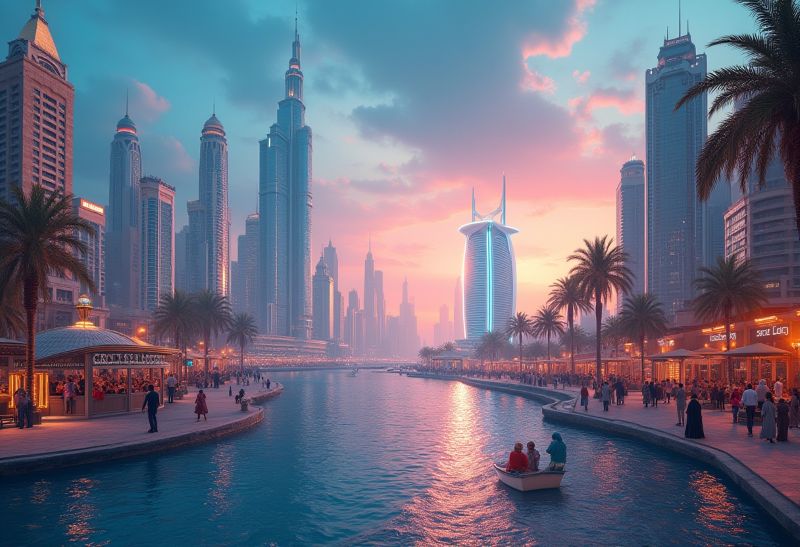Thursday, July 3, 2025

In a new report from the World Economic Forum (WEF), in collaboration with Kearney and the Saudi Ministry of Tourism, global tourism is set for remarkable growth in the next decade. By 2034, the sector will generate 30 billion trips annually, contributing a staggering $16 trillion to the global economy. Dubai, one of the world’s premier tourism destinations, is leading this transformation, driving investment and innovative strategies in the region.
The report, titled “Travel and Tourism at a Turning Point: Principles for Transformative Growth,” predicts that the tourism industry will expand 1.5 times faster than the global economy, cementing its role as a vital force for job creation, cultural exchange, and economic development.
Asia’s Surge as the Fastest-Growing Tourism Market
A key highlight of the report is the projected dominance of Asia in the tourism economy. Countries like India, China, Saudi Arabia, Thailand, and Sri Lanka are expected to spearhead the region’s rapid tourism growth. By 2030, India and China alone will account for more than 25% of global outbound travel, revolutionizing the flow of international tourism.
As Asia’s tourism GDP is expected to exceed 7% by 2034, nations across the continent are ramping up investments in infrastructure, branding, and innovation. This will help diversify their economies and attract a growing global tourism market. Dubai, as part of the Middle Eastern region, stands poised to benefit from these shifts, integrating its vibrant cultural and tourism offerings into a growing international demand.
Emerging Growth Drivers in Global Tourism
Several factors are contributing to the rapid evolution of global tourism. Sports tourism is projected to reach a market value of $1.7 trillion by 2032, driven by increasing interest in global sporting events. Ecotourism, which appeals to younger, experience-driven travelers, continues to grow at a rate of 14% annually, reshaping the way travelers choose destinations and experiences.
Additionally, the travel tech industry is experiencing explosive growth. Valued at $10.5 billion in 2024, it is expected to nearly double by 2033. This surge in technology-driven solutions in booking, accommodations, and transportation reflects the sector’s shift toward increased personalization and efficiency.
To accommodate 30 billion global trips, however, the tourism industry faces significant challenges. An estimated 7 million new hotel rooms will need to be built worldwide, and 15 million additional flights must be added each year. These infrastructure demands underscore the growing complexity of meeting rising tourism expectations.
Tourism Boom Faces Environmental and Workforce Challenges
While tourism’s expansion presents enormous opportunities, it also brings critical challenges that cannot be ignored. Without proper planning, the sector’s environmental impact could grow substantially. Greenhouse gas emissions from travel are projected to rise from 8% to 15% of global totals by 2034. Moreover, tourists are expected to generate 205 million tons of waste annually, accounting for 7% of global waste.
The tourism workforce is also under strain. High turnover rates, like the 53% staff turnover experienced in the UK hospitality sector between 2022 and 2023, highlight the ongoing challenges the industry faces in retaining skilled workers. Despite wage increases, U.S. hotels continue to struggle with staffing shortages, affecting the quality of service across key tourist destinations.
Commitment to Sustainable Tourism in Dubai and Saudi Arabia
Addressing these challenges, Saudi Arabia is making bold investments in sustainable and regenerative tourism. The country is committed to creating future-ready infrastructure, enhancing its destinations, and building talent pipelines to support a projected 150 million visitors by 2030. As the WEF’s report underscores, such initiatives are critical in ensuring that tourism growth is aligned with environmental sustainability and workforce empowerment.
Ahmed Al-Khateeb, Saudi Minister of Tourism, highlighted the importance of global collaboration in shaping the future of tourism. “Tourism is no longer a siloed industry—it is a powerful catalyst for economic growth and cooperation,” he said. Saudi Arabia’s focus on tourism innovation and responsibility provides a blueprint for other nations, including Dubai, to follow.
Balancing Growth with Responsibility for a Sustainable Future
As tourism grows, Dubai and other key destinations must prioritize sustainable infrastructure development, environmental stewardship, and local community benefits. The WEF report’s call for a “bold reimagining” of tourism suggests a future where growth is not just about numbers but about creating a tourism experience that is responsible, equitable, and enriching for all stakeholders.
The vision outlined by the World Economic Forum and industry leaders highlights a bright future for global tourism. With the right focus on sustainability, innovation, and community involvement, the tourism industry has the potential to become one of the most powerful economic engines in the world by 2034.
Key Tourism Stats to Watch
- 30 billion annual trips by 2034 (World Economic Forum)
- $16 trillion contribution to global GDP (WTTC)
- 25% of outbound travel by 2030 from India and China
- $1.7 trillion sports tourism market by 2032
- 7 million new hotel rooms needed globally
- 205 million tons of annual tourist waste by 2034
In conclusion, Dubai’s leadership in tourism, along with the rapid growth of Asia and the rise of new tourism trends, marks the beginning of an era of transformative growth. However, it is clear that a sustainable and collaborative approach will be vital to ensuring the tourism boom benefits all. As we look ahead, tourism must evolve to meet the demands of a changing world while preserving the resources and communities that make it so special.
«Enjoyed this post? Never miss out on future posts by following us»
Tags: Asia, Asia tourism economy, china, Dubai, Dubai Tourism, Ecotourism Growth, global tourism, global tourism growth, India, Middle East, Middle East Tourism, saudi arabia, Saudi Arabia Tourism Investment, Sri Lanka, sustainable tourism, Thailand, tourism destinations, tourism environmental impact, tourism industry 2034, Tourism news, Tourism Sustainability, travel and tourism GDP, travel industry forecasts, World Economic Forum report



